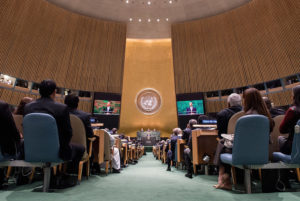
Delegates listens as President Obama addresses the United Nations General Assembly in New York City on September 24, 2014. [State Department photo/ Public Domain]
Kagan’s( Robert) newest book, The Jungle Grows Back: America and Our Imperiled World, fits nicely into his corpus. It is a spirited defense of the “American-led liberal world order” by one of its most cogent and articulate advocates. It is part curated history, part philippic for his preferred strategic vision for the United States.
In this small volume, Kagan argues that the enlightened order America created after World War II has allowed for much progress in the world. But this order is not natural, and its great benefits have been “made possible by the protection afforded liberalism within the geographical and geopolitical space created by American power.”
To Kagan, this liberal order is “fragile and impermanent,” requiring constant care by its architect and beneficiary, the United States. He sees the liberal order as being “like a garden, artificial and forever threatened by the forces of nature.” Thus “preserving it requires a persistent, unending struggle against the vines and weeds that are constantly working to undermine it from within and overwhelm it from without.” Otherwise, the jungle will “grow back and engulf us all.”
But the most important problem with Kagan’s argument is that, regardless of whether the creation of the liberal order was necessary after World War II, he fails to convince that it is truly necessary or desirable today.
He also fails to seriously grapple with whether natural shifts in the world make such an order unreasonably difficult to maintain no matter how hard we try. Instead of a careful consideration of American interests and a tight and specific argument about how certain means meet those ends given today’s threat environment, we get general arguments about the need to be tough, to pay costs to uphold milieu goals, and ominous imagery about a jungle overcoming our nice but unnatural garden.
It doesn’t engage with the toughest arguments about whether a single people like us, with a small share of global population and wealth, can infinitely desire and afford to provide all these public goods in the system without undermining the things we are trying to protect and support in the first place: our safety, our financial health, and our way of life. In other words, it doesn’t handle the problem that our specific part of the garden could desiccate by the costs and efforts of pulling weeds and cutting down the jungle.
Read more here.
If you’re willing to fight for Main Street America, click here to sign up for my free weekly email.




